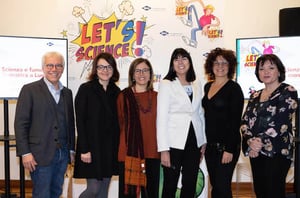During the Let’s Science! event held on November 17, 2018, the nutritionist Lucilla Titta, the scientist Adriana Albini and the oncologist Maria Cristina Marini took part in a round table, moderated by Giovanni Pellegri (L’ideatorio, USI, Lugano) and dedicated to the prevention of cancer through diet and lifestyle.
The meeting began with the recommendations that the World Cancer Research Fund recently updated on the basis of the most recent scientific evidence.
“Are the rules common sense? This is only partially true” said Lucilla Titta, head of the IEO Smartfood project. “The recommendations are based on exceptional work carried out by the World Cancer Research Fund and the American Institute of Cancer Research. These two prestigious institutes evaluate all the studies produced by the scientific community over the years, they compare the evaluations and then compile their recommendations. To give you an idea of the huge amount of work carried out, the first recommendations date back to 1997, they were then renewed in 2007 and the last ones date back to May 2018. All the information was evaluated, weighed and then communicated. This is not a case of advice for friends, but indications that are the result of global research.”
But what exactly are these recommendations? They can be summarized in 10 simple rules:
- KEEP YOUR WEIGHT WITHIN THE HEALTHY RANGE
- KEEP PHYSICALLY ACTIVE
- EAT MORE VEGETABLES AND WHOLEGRAINS
- LIMIT CONSUMPTION OF JUNK FOOD
- LIMIT CONSUMPTION OF RED AND PROCESSED MEAT
- LIMIT CONSUMPTION OF SUGAR-SWEETENED DRINKS
- LIMIT CONSUMPTION OF ALCOHOL
- DON’T RELY ON SUPPLEMENTS
- IF YOU CAN, BREASTFEED YOUR BABY
- AFTER A CANCER DIAGNOSIS, FOLLOW THESE RECOMMENDATIONS
A further two precautions are to be added to these 10, and are strongly recommended: avoid cigarette smoke as much as possible and protect yourself adequately from the sun. With regard to the first recommendation on the list (“Keep your weight within the healthy range”), to give an example, it is to be noted that the correct weight of a woman that is 1.70m tall is between a minimum of 52kg and a maximum of 72kg.
During the meeting, the scientist Adriana Albini (Uni Bicocca and IRCCS MultiMedica – Milan) highlighted how the Mediterranean diet reduces the risk of colorectal cancer and, in general, how a healthy diet helps to prevent cancer and to slow down the ageing process. She also pointed out how many unexpected foods contain therapeutic molecules, such as anthocyanin (found in colored fruit and vegetables), omega-3 fatty acids (in fish), resveratrol (in red wine) and polyphenols (in coffee): all these are anti-inflammatory and anti-oxidant. Even the hops in beer are beneficial, as well as the soluble polyphenols found in the wastewater of olive oil.
The oncologist Maria Cristina Marini (IOSI/EOC, Lugano) focused on current facts about cancer, highlighting some specific data: in Switzerland there are 56,000 new cases every year, and 18,000 people die from this illness each year. The most common cancers suffered by men are prostate, colorectal, lung cancer and melanoma, whereas women are affected most by breast, colorectal, lung and cervical cancer. The only thing we can do to deal with these risks, says Dr. Marini, is take proper preventive action.
The audience had many questions. A few of them are given below, together with the answers of the experts.
Why is cancer on the increase?
The incidence of cancer is increasing because the population is ageing. Cancer is associated with a defect that occurs during the cell formation process: the more a cell ages, the less it is able to fix errors. In addition, compared to a few years ago, tumors are being more widely-recognized and diagnosed.
How damaging are the substances used to treat food?
The impact of these substances is not to be overestimated: there are strict legislative controls that offer us sufficient protection. Furthermore, very heavy pesticides, like DDT, were used in the 1980s and 1990s, and are now banned: although the quality of plant-based foods has deteriorated, it has been shown that people that eat more fruit and vegetables statistically get sick less.
Are supplements good or bad for our health?
There are many different kinds of supplements and some can be harmful: in general, it makes sense to use them only if there is a demonstrated deficiency of them in your body or in your diet.
Are there not too many rules to follow?
In fact you only need to follow a few rules. To summarize: eat more plant-based and less animal-based foods and choose simple foods over more complex and processed foods.
How much meat should we eat?
The quantity of red meat we consume should be kept low (up to 500g per week), because this kind of meat, if consumed in large quantities, causes the harmful effect of protein oxidation. It is important to avoid overloading our bodies with animal proteins every day. In general, it is a good idea to reduce them (without eliminating them), to vary the animal-based proteins we consume and to increase our consumption of plant-based proteins.

